Time’s Up: from piracy to fair trade (2/2)
Published 20 December 2016 by Ewen Chardronnet
Part 2 of our interview with the Time’s Up collective from Linz on their floating investigation of fair trade sail cargo practices. A panoramic view from the Danube to Africa, from the Caribbean to Brittany and the Irish Sea.
After reflecting on 20 years of investigations and experiments with unidentified floating objects on the waterways, Austrian artists and activists collective Time’s Up continues this week with an overview of sail cargo shipping. They explain how their visit to the maritime festivals in Brest and Douarnenez last July greatly inspired them. Happy sails!
Does the fair transport movement apply for public funding? How do these initiatives remain independent?
There is a strong distrust of the culture-funding establishment, or of funding in general. Fairtransport was somehow burned in an EU project, while Feral Trade operates without external funding. The aim of many operators within the sail cargo community is definitely independence and interdependence, but not dependence on some large, all-powerful funding body. The Fairtransport group has an umbrella company, a shipping company, the rum company and the two companies that each run a ship, plus other companies that are using the Tres Hombres name—for chocolate, for instance. It’s an ecosystem of businesses and enterprises, small enough to be nimble, big enough to work, not too big to fail.
Tres Hombres rum, made in the West Indies and shipped by sail cargo (in French):
The Fairtransport group helps crew members at the sailing school EZS (Enkhuizer Zeevaartschool), which encourages the appearance of competent shippers who can expand the network. This counteracts comfortably with the current modality of commerce that we see around us: expansion for its own sake, profit as the only directive, growth at all costs. Perhaps these sail cargo companies are not only good for the oceans, but good for commerce and the way we trade as well. Trade, done properly and not as some kind of colonial extraction, is perhaps the most effective and long-lasting social lubricant we have. Not the trade of market share and stock market perceptions, but exchange of value between equals.
The multi-stage plan of the Fair Winds Trading Company fits precisely in this idea of a network of trading partners. Its founder Madadh MacLaine has developed a personal network of connections within communities in Casamance, Senegal. 2016 was the year that several larger companies took notice and asked for several dozen kilograms of Touloucouma oil. The next stages will see several tonnes of oil being delivered, the proceeds of which should be used to provide oil presses in the Casamance region, so that production can be controlled by the communities rather than the remote powers in Dakar.
It is also quite interesting to see the emergence of sail cargo along the West African coast. One group that we spoke to in Nantes was interested in supporting a flotilla of small sailing cargo vessels, operating along the West African and West European coasts. Not large boats full of rum, but smaller ones shipping oil, dried fish, whatever needs transporting. But with a flotilla of smaller vessels operating, the ability of a central control agency to control every sailor would become impossible. While not along the density of the inflatables jam-packed with refugees that wash up in Lampedusa, such vessels could maintain a steady stream of reverse colonial migration, bringing Africans to Europe and enhancing a two-way flow.
Not all of the players in this ecosystem are ships?
There are lobbyists and organizers, such as Kevin Alwright at International Windship Association and Robbert van Hasselt at Sail, pushing for changes and drumming up support. Perhaps more immediately important, there are the providers of infrastructure and logistics support such as TOWT (Transoceanic Wind Transport) in Douarnenez. After a maritime festival in Brest, France, I had the pleasure of crewing on the Grayhound for a day as we sailed to the small city of Douarnenez. Traveling from Brest to Douarnenez were the two initiators of TOWT: Guillaume Le Grand and Diana Mesa. They were using this opportunity to move the center of their lives from the hubbub of Brest, a town with a venerable maritime tradition and a huge naval harbor, to the smaller town of Douarnenez on the south side of the same bay where Brest lies. They have spent the past few years using a small warehouse in Douarnenez as the nexus for their expanding network of Wind Transport, serving a number of French vessels, as well as the Tres Hombres, the Grayhound, the Lun 2 and the Nordlys. It has recently become clear that the continued growth of their organization requires systematic support, which was not forthcoming in the large city of Brest, but was to be found in Douarnenez’s Port Rhu. So the entire business, with office, shop and warehouse, but also their home, was moving to the smaller town.
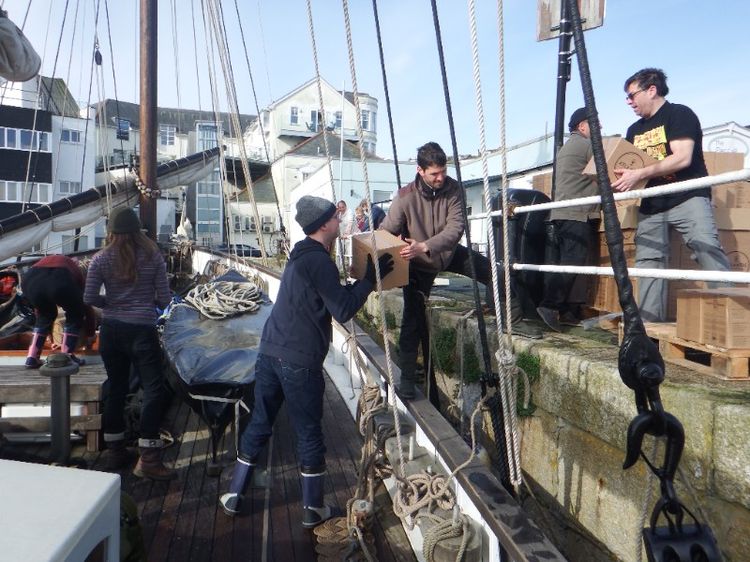
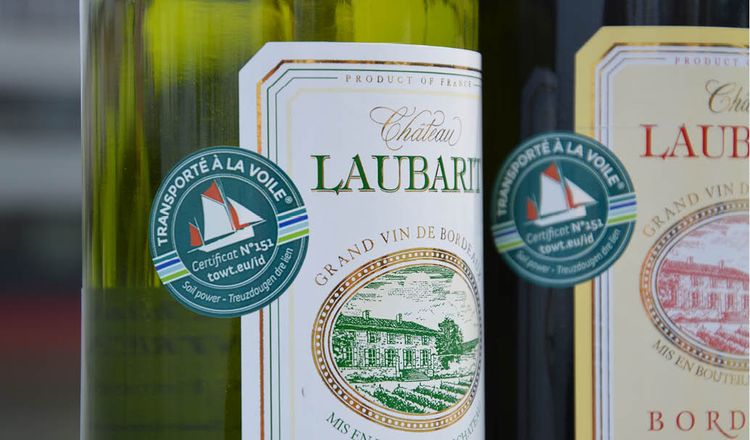
Is it easy to start a clean shipping company?
As we were discussing the pros and cons of clean shipping, a question arose early about starting a shipping company on the Danube, which we thought was a preposterous idea and promptly forgot about. But one thing led to another, discussions were had, and we found that, at least in principle, a sustainable shipping company on the Danube is not to be regarded as impossible. How does one make it happen? We see only two options. Option 1: Do it anyway. Find a boat, register it as a sport boat and start carrying things. If it works for smugglers, why not? Option 2: Do it “properly” with all the documentation.
A clean shipping company, sustainable in all ways, will have to take various factors into account: emissions, social issues, energy issues. Based on Small Is Beautiful by Ernst Schumacher and the strangely phrased ideas within, the smallest (and thus most beautiful) business is a person or two. So our transport vessel must be small, to be handled by one or two people. We have taken an early 1960s sailing vessel, weighing in at 500kg, and adapted it for freight. The floor and the floor beams have been made more solid, the sail replaced with a powerful gaff rig. But more importantly, we need backup power for negotiating small corners and adverse currents. The Tres Hombres and the Nordlys fight through with no motor of their own, the Grayhound and the Avontuur have motors on board to be used when needed. Each has their advantages. We have chosen, because we are not crossing oceans, to go with a very simple solution: electric propulsion. We have had conversations with a local publisher to deliver comics, a local brewery to deliver a ginger beer, and have a few other avenues open.
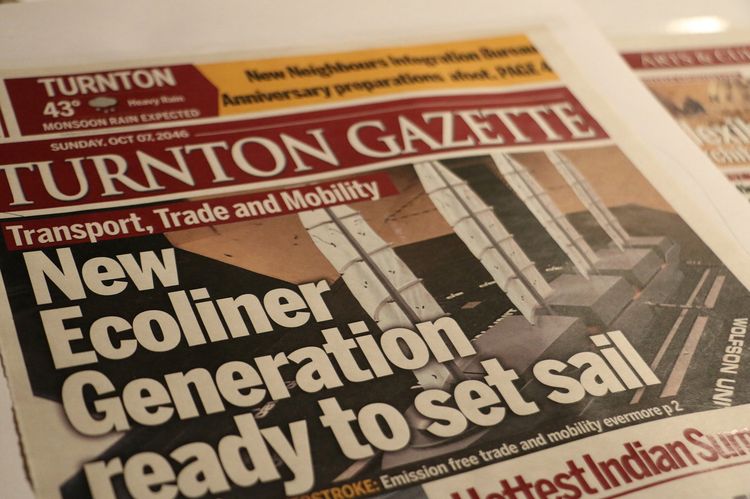
Legend has it that Tres Hombres rum, aged by the rolling of sail cargo shipping, is better than the rest… Are there any other pirate initiatives?
The world of sail cargo is, of course, also a world of adventure. Volunteer carpenters or sailors, rum drinkers or cartoonists, they enjoy the romance and adventure. The approach of Quetzal Shipping and Trading, from Palnackie in West Scotland, is wildly different from that of the other groups we met. There is nothing international, no fine rums or fairly traded chocolate, no maritime traditions. The goal of Quetzal, at this stage, is to move stuff—whatever is needed, however possible. Members of the group have experience transporting horses, building ships, driving and repairing trucks, building houses and generally being useful in their communities. They have local suppliers of animal feed and hardware that need deliveries to the Isle of Man. Because there is no ferry service from Scotland, this must all go via Liverpool, a long detour. So the Quetzal approach is “let’s get it there”—cheaply, with some adventure, in small boats using the wind and tide of the Firth of Solway to their advantage. The return trip from the Isle of Man will be used to bring supplies from the small breweries on the island to some local pubs.
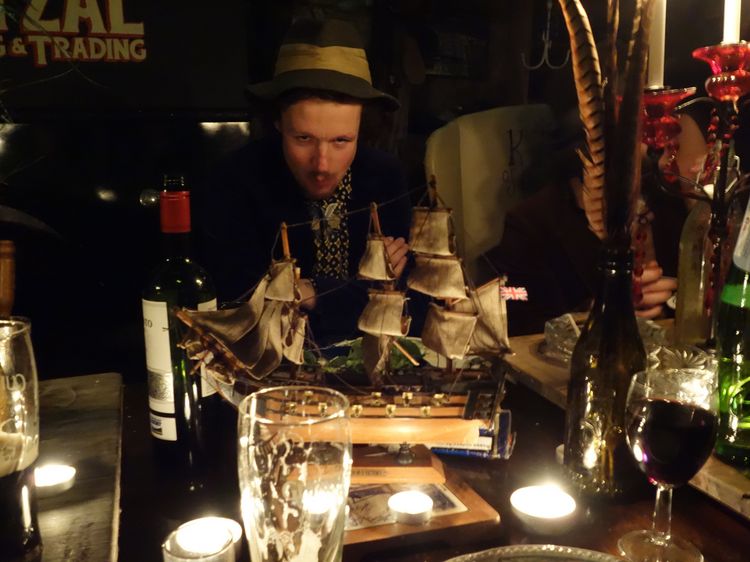
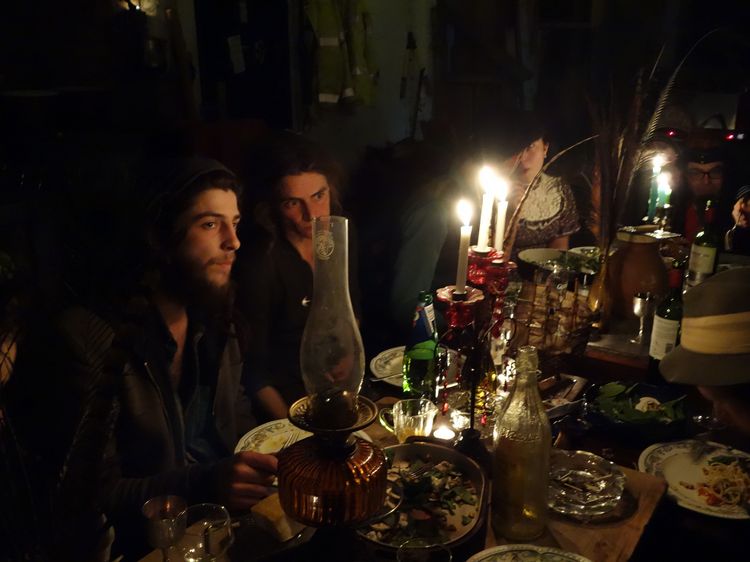
Are communities at the core of the projects?
Echoing the words of Carlo Petrini, the founder of the Slow Food movement, who apparently wanted to be a sailor or a shepherd, people are looking at finding places to settle down. As TOWT solidifies its base in Douarnenez, Grayhound’s skippers have bought a small farm building and large garden nearby. Other people from Fairtransport and New Dawn Traders have also been known to dream about the possibilities of settling down, at least for part of the year.
At the Sailing Cargo Alliance (an informal group of sail cargo people, feral traders, activists and event organizers), which met near Douarnenez in early November 2016, one of the exciting things that came out was the desire for stable points for living and supply, which turned into ideas of permaculture-inspired ecovillages along the coasts of Europe and the Caribbean. The Ceiba project in Costa Rica is planning to build a ship, but has started by planting trees to help the local ecosystem. One of the flags that we saw during our transiency was the Celtic multi-flag, combining the flags of various Celtic nations, from Scotland, through Wales, Brittany and down to Galicia. Perhaps a transnational Celtic permaculture sailing state is in emergence.
Presentation of the «Ceiba» ship project in Costa Rica:
You also talk about Onion Johnnies, who once transported their onions by sail and by cycle from Brittany to London. Some people are reviving this tradition during their holidays.
Wonderful stuff! I am looking forward to meeting some proper Johnnies. We are told over and over again that the age of the career is dead, that there is only lifelong learning and precarious jobs. So why not have a working holiday?
This also feeds in nicely to the whole question around the pan-Celtic trading networks. Brittany is really the first and best port of call. If you are interested in transport issues, then train and trucks within the EU are probably cleaner than the container ships belching sulphur-laden black smoke. So landing in Brittany and distributing from there, whether by road, rail or canal, seems to be the way to go.
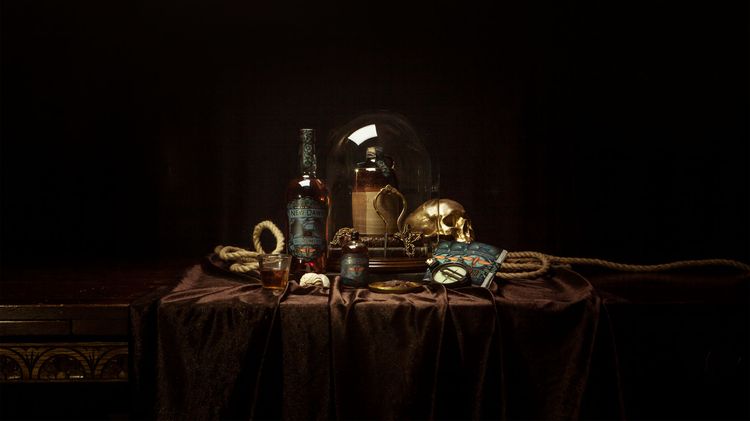
Given the encouraging success of TOWT in Douarnenez, fair trade sail cargo seems to be developing in Brittany.
Maybe this is a good place to also think about the plurality of contributions in a community. Sailmakers and boat builders are obviously part of the land crew, but so are farmers and other providers, as well as brokers of cargo and the people who write software to optimize trans-shipment, the logistics of cargoes. There is the whole infrastructure of weather prognoses, and the emerging field of course-planning, so-called weather-routing, where it is useful to pay attention to probable weather patterns and how they will help get cargoes over water most effectively and efficiently. This is already used by the fuel-driven cargo industry, to minimize the fuel costs of driving into a headwind, as well as by people like Ellen McArthur as she rocketed around the world. This brings us back to Sailing for Geeks, since too much of the community is diehard anti-tech. Some friendly, open-source savvy, gender-politics aware practitioners would be a boon.
What are your projects?
At the moment we’re giving a series of workshops in Malta: Presents of the Future, during the Maltese presidency of the Council of the EU in 2017. Who knows, maybe this project will lead to maritime adventures between Malta and Lampedusa, Tunisia and Sicily!
